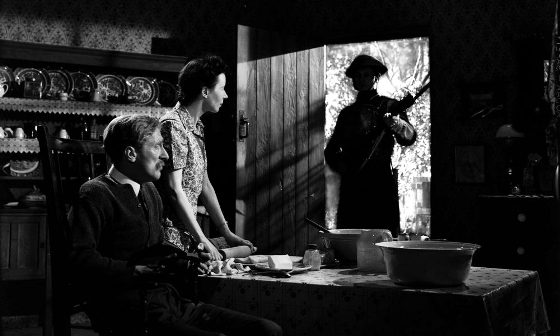
 One of the most unusual examples of propaganda ever filmed, made in the midst of the Second World War, imagines what it would be like if Germans captured a small English town in preparation for a major invasion.
One of the most unusual examples of propaganda ever filmed, made in the midst of the Second World War, imagines what it would be like if Germans captured a small English town in preparation for a major invasion.
Propaganda has gotten a bad name over the years. All it means, really, is information that presents a point of view, usually of a political nature, but so often it has meant governments trying to mislead people about facts and conditions in order to gain or maintain power. So this has become the general sense by which we understand the word. But propaganda has also been used to boost morale during wartime or other national crises, like the flag-waving films that were prevalent in America during World War II. However, in Great Britain during that war, they had some extraordinary filmmakers who weren’t jingoistic or pushing a hard sell message in their films, but genuinely tried to show the reality of the war, and especially the conditions and actions of people on the home front. These British films are works of art in their own right. And by far the most unusual, the most extraordinary movie of this kind was a work of fiction. Based on a short story by Graham Greene, and released in 1942 at the height of the conflict, its title was a question: Went the Day Well?
A group of soldiers arrives at the quiet little village of Bramley End—to conduct training exercises, according to their commander. The villagers welcome them, putting the officers up at various homes, while the regular troops stay at the town hall. Over the next couple of days, some odd details cause one young woman, the daughter of the local vicar, to be suspicious. One soldier claims to be from Manchester but is ignorant of certain details about that city. A scrap of paper used for scoring a card game features some words in German. The audience is eventually let in on the secret before the characters figure it out. These are German soldiers laying the groundwork for an imminent invasion of England. By the time the villagers figure this out, it’s too late. The Germans drop the pretense and herd everyone into the town hall, warning that resistance will result in mass executions. The people need to do something to get help and warn the outside world of the threat. But how?
The title Went the Day Well? is from a patriotic poem of the time: “Went the day well? We died and never knew. But well or ill, freedom, we died for you.” From the storyline I’ve described, you might expect the movie to be one of those lighthearted romps where the common people easily outwit the enemy, triumphing through their plucky ingenuity. But no, this is dead serious. Escaping the trap won’t be easy, and what makes the film really different is that the stakes are set as high as they would be in real life. The violence is ruthless and explicit, which is rather shocking for a movie from 1942. To defeat the enemy, people will have to put their lives on the line.
The film was designed to inspire courage on the home front during a war that was still going on, but despite the propaganda-style motive, this is actually a really exciting movie. In fact, it’s thrilling. Accepting the story’s premise, which is of course rather implausible on the face of it, leads the viewer into an intense and gripping drama of life and death. The British audience experienced how it might feel to be under enemy occupation, and the fear and desperation that would involve.
The director was Alberto Cavalcanti, a Brazilian of Italian descent who emigrated to England in the 1930s, joining the national documentary unit and quickly becoming one of the more prominent, and adventurous, British directors. To make a film during the war that portrayed an infiltration into the country by the Germans was a very strange idea, and the overall feeling from the movie is almost pacifist. War is a horrifying and terrible thing, it’s saying, which is never good but at times may be necessary.
The picture was a sensation, with the public and the critics, and Cavalcanti always said it was his favorite film. I don’t want to spoil things by telling more. Besides being exciting, this is a patriotic film as well, in the sense of people having to unite and pull together to save themselves and their country. And that sense of unity in the midst of unimaginable crisis is just what the British government wanted to inspire in a population that had already been through three years of hardship, with an unknown length of time still ahead.
Went the Day Well? is one of the most intelligent, subtle, and explosive bits of propaganda ever put on film. And it still holds up today.






